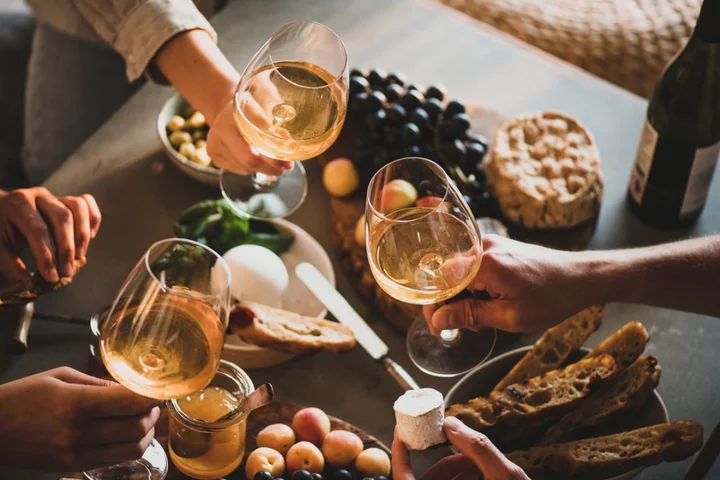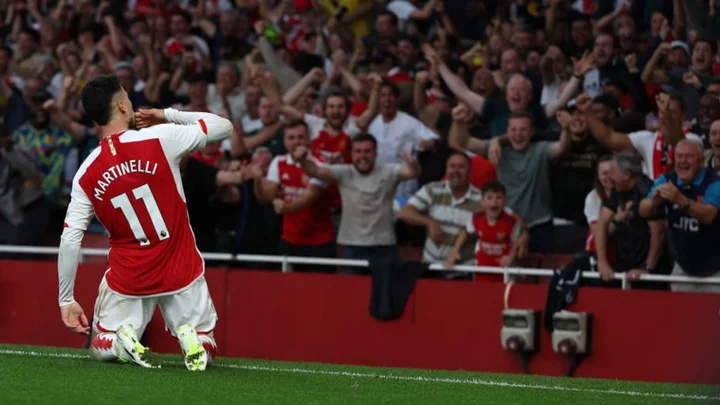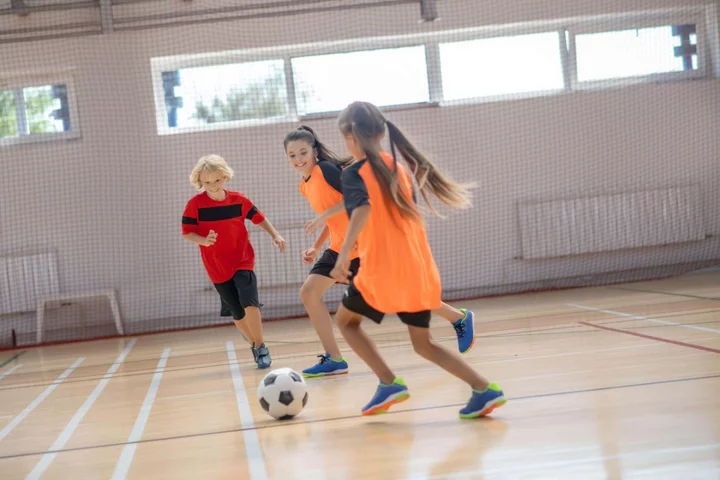
Francis Ngannou Mixed Up Push and Pull, Destroyed a Shop Door
VIDEO: Francis Ngannou made a shop door explode.
1970-01-01 08:00

Brits pay more for wine when trying to impress guests, survey finds
Wine drinkers typically spend £9 on a bottle for themselves but £12.50 when hosting – to impress their guests with a pricier plonk. A poll of 2,000 wine drinkers found 44 per cent splash out when hosting at Christmas, with this rising to 56 per cent when gifting to someone else, as 27 per cent still think premium labels are better quality. While three-quarters will do so because they want an expensive bottle to celebrate a special occasion and 35 per cent want to impress their guests. However, 23 per cent admit they find buying wine a stressful experience – with 51 per cent of these claiming there are too many options to choose from. And 46 per cent don’t know how to identify a good bottle from a bad, whereas 32 per cent are simply bewildered by wine jargon. The research was commissioned by Lidl GB, to mark the return of its Chateaux Noir events, which are designed to democratise wine and challenge preconceptions about wine etiquette through a tasting experience in total darkness. The sensory events will see the supermarket take on major drinks brands as it aims to dispel the belief drinkers need to blow the bank to enjoy quality booze. It also emerged 51 per cent of wine drinkers tend to stick to what they know, and 49 per cent choose a bottle based on where it comes from. Whereas 45 per cent will default to whatever is on offer, 23 per cent have a ‘go-to’ bottle, and 18 per cent will opt for whatever label they like to look of. However, 24 per cent wish they knew more about wine – with nearly a third saying they would experiment with different wines if they knew more about them. But while many are keen to experiment with wine, there are some rules they certainly won’t abide by. For 43 per cent, they are happy to serve white with a dish that isn’t fish, and 39 per cent will drink rose all year round. Many don’t mind if their bottle is corked or a screw top (37 per cent), and 35 per cent will drink champagne from any glass, not just a flute. More than three in 10 (31 per cent) will even chill a bottle of red and 30 per cent will pop a few ice cubes into their vino on a warm day. In fact, 31 per cent find ‘wine etiquette’ snobbish, with just eight per cent believing that following traditional ‘rules’ of wine etiquette enhances their enjoyment of the drink. The events will be hosted by Lidl GB’s master of wine, Richard Bampfield, and will see guests enter a ‘palate cleansing tunnel’ before a blackout wine tasting room. He said: “At Chateaux Noir, not only do we want to challenge preconceptions about affordable wine and prove to customers that great taste isn’t determined by premium branded price tags, but to open people’s minds and challenge what they think they know already about wine. “So, if you think you’re a strictly red drinker – think again. “We’ll reveal how similar flavour profiles can carry across different categories that you might never have otherwise considered. “This Christmas, Chateaux Noir is encouraging shoppers to rip up the rule book and start experimenting - ultimately, there is no ‘right’ or ‘wrong’ way to drink wine – if you love it, then that’s all that matters.” Over 18s can secure tickets for the Chateaux Noir events, which will take place in London, Glasgow and Liverpool in November, at, with all proceeds going to the NSPCC. Read More Brits are so fed up with emails that retail giants now send reminder letters Brits reveal advice they would give their younger selves - including investing in property Brits will eat over 5,000 slices of pizza in their adult life, study finds Beauty advent calendars 2021: Our guide to this year’s top treats 13 best tech gifts to spoil a gadget geek this Christmas 10 best luxury Christmas crackers for dressing up your dining table
1970-01-01 08:00

How 1-0 victory helped Arsenal leapfrog Man City in the Premier League form table
How the Premier League form table was affected by Arsenal's victory over Manchester City before the October international break.
1970-01-01 08:00

Birkenstock set for its stock market debut as Wall Street trades in its wingtips for sandals
Birkenstock is making its debut on the stock market as Wall Street trades in its wingtips for sandals for a day
1970-01-01 08:00

How to complain about your upcoming student loan bill
On the bumpy road to repayment this fall, student loan borrowers have some qualms
1970-01-01 08:00

PE ‘enjoyment gap’ widens for girls: Why it matters and how we can help
The number of girls who say they enjoy school PE lessons has dropped over the last six years, new figures suggest. Less than two in three (64%) female pupils said they liked taking part in PE, compared with 86% of boys, according to the survey by the Youth Sport Trust charity – a drop from 74% of girls in 2016/17. The PE ‘enjoyment gap’ was even bigger for secondary school students – just 59% of girls in this age range said they enjoy PE. Nearly 25,000 pupils in England aged seven to 18 were polled by the charity. And 64% of the female respondents said they want to be more active at school but there are barriers getting in their way – including not feeling confident, having their period, being watched by others and worrying about how they look. Ali Oliver, chief executive of the Youth Sport Trust, said: “We must be absolutely committed to understanding the experiences of young women and girls, how these are constantly changing in a complicated world, and be better at working with them to address the barriers they face. “At a time of unprecedented low levels of social and emotional wellbeing, we know getting things right for girls in PE can be life-changing.” Listening to girls’ concerns It’s a topic that strikes a chord with many experts from this field. “It is so important to listen to girls’ concerns when it comes to the barriers they are experiencing, because we know these barriers are something that can stay with them throughout adolescence and into adulthood,” Vicky Fitzgerald, health improvement lead at health and wellbeing charity Nuffield Health, told the PA news agency. “Research has suggested that women in particular face more barriers to fitness than men, citing impacts such as a lack of time, motivation and knowledge, as well as caregiving responsibilities. By addressing these concerns from a young age, we are then able to support where needed, identify solutions, or provide alternatives to reignite engagement.” Wider benefits As the Youth Sport Trust highlights, the benefits of sports and PE are far-reaching. Charlotte Fray, rugby player with Leicester Tigers Women and a sports coach at Leicester Grammar School, agreed: “Sport is massive for confidence and forming lasting friendships. For young girls especially, if they enjoy what they’re doing they are going to have more confidence. “It’s a great way to remove any stressors from their life and have time to switch off, whilst discovering a love for sports.” Alex Caird, school games organiser at charitable trust, SASP (the Somerset Activity & Sport Partnership), added: “School sport is an incredibly valuable tool to teach life skills that are transferable from classroom to sporting environments and back again, and it is fundamental that these opportunities are tailored to the young people we aim to impact.” Shifting mindsets Caird believes making accessibility part of the culture of PE and sports lessons plays an important part. “At SASP, we not only empower more students to get involved and feel confident, but also school staff to see the difference physical activity makes to their own teaching confidence, to try new things and seek out further opportunities for their students to flourish and grow,” Caird explained. “We’re determined to use sport as a vehicle to drive this healthier lifestyle change, as well as build physical activity into a healthy school culture that sees the benefits of holistic experiences for all young people in any activity, not just the ‘traditional’ sporting calendar setup.” Education around women’s health also needs to be a priority... Fitzgerald meanwhile added: “Education around women’s health also needs to be a priority. An understanding of menstrual cycles and how they impact young girls, confidence/self-esteem concerns, questions around skills or ability – having an understanding of how all of these impacts can affect an individual removes the pressure or fear of them having to explain it.” The power of role models Dr Jackie Day-Garner, associate dean of the School of Health, Social Work and Sport at University of Central Lancashire, believes setting positive examples is key. “An active mother, parent, or teacher in the early years can help to influence positive behaviours around physical activity. And role models such as social media influencers or female athletes could help teenage girls to engage more in sport,” she said. “We’ve already seen the increase in the visibility of female sport on television, with England netballers contesting a World Cup final and the Lionesses winning the Euros and becoming finalists in the World Cup. We’ve also seen prolific sports women wanting to empower girls to play sport. For example, Leah Williamson speaking at the UN assembly about the topic.” While Fray believes having “different kinds of role models” helps inspire girls to find activities they’ll enjoy. “Rugby is great for this, as there is so many different shapes and sizes within the game, that everyone can find a role model. Girls can realise they don’t have to fit a certain category to play sport. There are so many different sports out there,” she added. Widening the options Fitzgerald believes we also need to show girls from a young age that there are lots of different ways to be active. “If PE isn’t enjoyable, try to find an alternative which introduces exercise in a less-pressured environment. Programmes such as Nuffield Health’s Move Together is an example,” she said. “These free classes are specifically designed as a solution for the barriers that young girls have cited. “They are available in local communities and offer a multitude of classes, from Zumba to HIIT, strength training, cardio classes and more, to inspire young girls to find a type of movement they enjoy.” The choice of activities available in high schools is also important, added Day-Garner. “There has been too much emphasis on organised sport. It might be more appropriate to look at what activities girls are likely to engage with when they leave school, as women often a re-engage with exercise in their early 30s.They might join a gym or leisure centre, or participate in classes such as Zumba.” Read More The psychology of Big Brother: How to survive in the house How to support someone coming out in their 30s and beyond Israel-Hamas conflict: How to talk to teenagers about distressing news stories Autumn décor ideas for a seasonal refresh Why you shouldn’t tidy your garden too much in autumn World Mental Health Day: 5 ways to beat anxiety and change your life
1970-01-01 08:00

21 Old and Odd Directional Words
The rich history of the English language is full of similar directional words that are cool but uncommon, like ‘pancakewards,’ ‘couchward,’ and ‘pocketwards.’
1970-01-01 08:00

A $245 Billion Selloff Signals Less Sparkly Future for Luxury Stocks
The wealthy shoppers who fueled LVMH’s rise to Europe’s most valuable company and made its founder the world’s
1970-01-01 08:00

Scientists winkle a secret from the `Mona Lisa' about how Leonardo painted the masterpiece
The “Mona Lisa” has given up a secret
1970-01-01 08:00

Disneyland Lifts Prices Up to 9%; Florida Annual Passes Rise Too
Walt Disney Co. is raising ticket prices at its Disneyland resort by up to 9% and lifting annual
1970-01-01 08:00

How does the new Honda Pilot stack up against the 2024 Toyota Grand Highlander?
The Honda Pilot has become a byword for the affordable midsize SUV
1970-01-01 08:00

Steve Rider tells men to ‘recognise your vulnerability’ after prostate cancer diagnosis
Sports commentator Steve Rider has shared a message encouraging men to be conscious of their health after his prostate cancer diagnosis. Rider, 73, was told he had the disease last month after a biopsy. The former Grandstand and Sportsnight presenter will undergo surgery to treat it this weekend. Ahead of the operation, Rider shared some insight into his journey to diagnosis, which began when a friend was diagnosed during a routine health check. “He had a scan which showed some alarming things going on with the prostate and within a month he had the full operation and that woke everybody up because he had no symptoms and very fit guy, and roughly our age,” Rider told the PA news agency. After initially testing, Rider’s readings for cancer were “not that high”, so he’d planned not to take further action. His wife, Jane, urged him to have further tests, and a biopsy was taken. He continued: “I thought the worst that can happen is that I’m going to be monitored for the next six months or so and we got the results of the biopsy the next day and they said, ‘No, you come in as soon as you can, we’re going to operate.’” Rider said his diagnosis was aided by his friends having open conversations and his wife encouraging him to get further tested. “We do tend to treat these things a little bit like getting your eyes tested or ears done, you can put it off and maybe think ‘Well, I’ll wait till the symptoms come’. “Symptoms don’t come and when they do, it is probably too late.” He added: “The message is to recognise your vulnerability, especially with age and family history and so on. And if you do feel that you fall into those categories, then get yourself checked.” According to the charity Prostate Cancer UK, 144 men are diagnosed across the country each day – more than 52,000 per year. Rider’s former BBC colleague Bill Turnbull died in August 2022, nearly five years after being diagnosed. After sharing his diagnosis publicly in March 2018, Turnbull detailed his treatment in a Channel 4 documentary called Staying Alive. Speaking about the late broadcaster, Rider said: “The great thing about Bill was that he wanted to turn his misfortune into an information campaign which would save hundreds of others and I’m sure that probably hundreds and thousands of men have stepped back from a really serious cancer because of the attention that Bill Turnbull brought to early diagnosis and testing. “And apart from that, he was a lovely, lovely guy.” Rider found out that he had cancer the day after taking part in sports presenter Jeff Stelling’s charity Football March in Turnbull’s honour. Prostate Cancer UK has said the disease affects one in eight men in the UK and that more than 12,000 men die every year from the condition. They advise that if a man is over the age of 50, Black, or has a family history of prostate cancer that he may want to speak to a GP as these are higher risk factors. To find out more about your prostate cancer risk, or that of your partner, father or friend, you can visit Prostate Cancer UK’s website – prostatecanceruk.org/risk-checker – and try the 30-second online risk checker. Additional reporting by PA Read More Cancer cases in young people ‘are rising’ – the warning signs to look out for Jeff Stelling leads hundreds to complete Wembley to Wycombe walk in honour of Bill Turnbull Duran Duran’s Andy Taylor claims he was ‘visited by angel’ after starting new cancer treatment The psychology of Big Brother: How to survive in the house Sports culture is ‘intimidating’ and putting people off working out Israel-Hamas conflict: How to talk to teenagers about distressing news stories
1970-01-01 08:00
